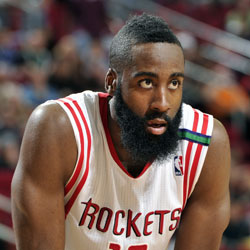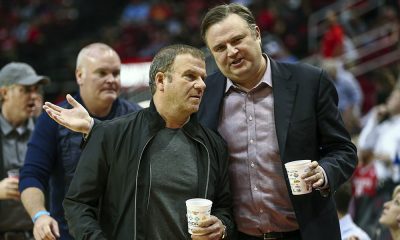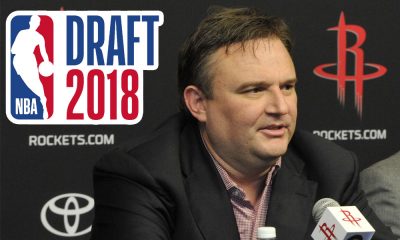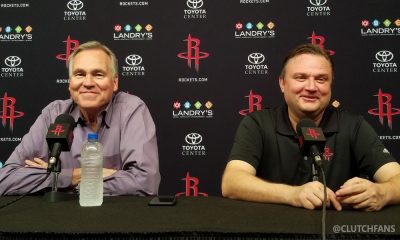Houston Rockets
Houston Rockets Salary Cap Update: The Impact of Harden’s Deal
Now that we’re nearly a quarter of the way through the 2012-13 NBA season, let’s take a look at the team’s current salary cap situation.
Published
12 years agoon
Now that we’re nearly a quarter of the way through the 2012-13 NBA season, let’s take a look at the team’s current salary cap situation.
The Rockets’ Latest Moves
Since my last update, the Rockets have made the following roster moves:
- The Rockets traded Kevin Martin, Jeremy Lamb, two first round picks (those owed from Toronto in the Kyle Lowry trade and from Dallas in the Jordan Hill trade) and a second rounder (owed from Charlotte in the Courtney Lee sign-and-trade) to Oklahoma City in exchange for James Harden, Daequan Cook, Cole Aldrich and Lazar Hayward.
- The team trimmed the regular season roster down to the maximum of 15 by waiving Shaun Livingston, Gary Forbes, Hayward, JaJuan Johnson, Jon Brockman, Demetri McCamey and Kyle Fogg.
- The fourth-year option on the contract of Patrick Patterson was exercised.
- The third-year option on the contract of Marcus Morris was exercised.
- The Rockets signed Harden to a five-year, maximum salary extension. More on that below.
The Harden Contract
While most reports of Harden’s extension pegged it at $80 million (actually, $78.6 million), the figure is merely an estimate based on the salary cap for the 2012-13 season. However, since the starting salary of the extension is based on salary cap figures for the 2013-14 season, the actual amount of Harden’s salary will not be known until around July 10, 2013, when such figures will be determined. The starting salary of Harden’s extension will be approximately 25% of the 2013-14 maximum team salary cap (although that figure could increase to 30% in the unlikely event that Harden wins the NBA MVP award this season).
The fifth year of Harden’s extension is actually only 50% guaranteed, but it becomes fully guaranteed if Harden meets any one of several incentives that should be fairly easily attainable for him. Such incentives include making at least one All-Star team starting next season (so this season doesn’t count), playing a key role in the Rockets advancing to the second round of the playoffs, or meeting certain statistical marks (which are geared to avoid a ball-hogging situation in order to meet them).
By being signed to a five-year extension (as opposed to only four years), Harden has become the Rockets’ “Designated Player,” meaning that the Rockets may not sign any other player to a five-year contract extension for the length of Harden’s extension (through 2018). The Rockets may, however, acquire another team’s Designated Player via trade during that time. For instance, if the Rockets somehow traded for someone like DeMarcus Cousins in the next few months, they would be unable to offer Cousins the same type of extension they gave Harden; however, if Cousin were made Sacramento’s Designated Player and then traded to Houston later down the road (say, 2-3 seasons later), it would be permitted for the Rockets to have both Harden’s and Cousins’s contracts on the books at the same time.
Salary Commitments and Available Cap Room
(All salaries courtesy of ShamSports.com)
Barring any further roster moves, the Houston Rockets now have approximately $50.2 million in team salary for the 2012-13 season: Jeremy Lin ($8.37 million), Omer Asik ($8.37 million), Harden ($5.82 million), Cook ($3.09 million), Carlos Delfino ($3 million), Aldrich ($2.45 million), Patterson ($2.10 million), Toney Douglas ($2.07 million), Morris ($1.91 million), Royce White ($1.65 million), Forbes* ($1.5 million), Terrence Jones ($1.49 million), Donatas Motiejunas ($1.36 million), Hayward* ($1.17 million), Johnson* ($1.09 million), Livingston* ($1 million), Brockman* ($1 million), Chandler Parsons ($888,250), Greg Smith ($762,195, of which 50% is guaranteed), Machado ($473,604, of which 50% is guaranteed), and the cap hit from the Derek Fisher* buyout ($644,005; more on that here).
[* – indicates players no longer on Rockets’ roster. Also, ShamSports.com shows that the Rockets also owe E’Twaun Moore $381,098 (50% of his 2012-13 salary), supposedly the product of a renegotiation of his contract with Boston prior to the Courtney Lee sign-and-trade deal in which the Rockets acquired him. However, according to a source familiar with the Rockets’ salary cap situation, the Rockets have not paid Moore; hence, I am disregarding this salary for purposes of my own cap calculations. However, even if ShamSports.com is correct about Moore, the acquisition of the Charlotte Bobcats’ 2013 second round pick from Boston was well worth the small incremental loss of cap space, as it contributed to the acquisition of Harden.]
Based on this season’s maximum salary cap of $58.044 million, the Rockets have approximately $7.84 million in salary cap room entering the season (or about $7.46 million if they do, in fact, take a cap hit on Moore). For the record, the Harden trade actually increased the Rockets’ available cap room this season.
It will be very interesting to see what GM Daryl Morey does with that cap room, which allows him to take on that much more incoming salary in trades without regard for salary-matching rules. With only Cleveland, Houston and Phoenix possessing cap room of any significance, the Rockets may be a popular team this coming trade deadline as a landing spot for other teams’ bloated (but likely expiring) contracts, with Houston receiving some form of compensation (draft picks, cash, etc.) for its troubles. That will probably be only a backup plan for Morey, who more likely will attempt to use that cap room to acquire a star-level player via trade. With the Rockets slated to have even more significant cap room next summer (see below), don’t expect the Rockets to take on salary beyond this season unless it involves the Rockets acquiring a star-level talent in the process.
Interesting (Well, Not That Interesting) Fact
With the contracts of Lin and Asik structured so that they are only actually paid $5 million each this season despite their cap figures, the Rockets’ highest-salaried player this season is Harden at a relatively paltry $5.82 million. That appears to be the league’s lowest “team-high salary.”
The player being paid the second most money this season by the Rockets?
That’s Luis Scola, who currently plays for the Phoenix Suns but is still being paid approximately $5.26 million this season by the Rockets.
Summer of 2013
Based on the salary cap remaining at $58.044 million, barring any trades happening this season (yeah, fat chance) and assuming that Harden does not win the league MVP this season, the Houston Rockets will have approximately $45.8 million in team salary for the 2013-14 season: Harden ($13.67 million), Lin ($8.37 million), Asik ($8.37 million), Delfino ($3 million, non-guaranteed if waived by June 30, 2013), Patterson ($3.11 million), Morris ($1.99 million), White ($1.72 million), Jones ($1.55 million), Motiejunas ($1.42 million), Parsons ($926,500), Smith ($884,293, non-guaranteed) and Machado ($788,872, non-guaranteed). That amount could increase if the Rockets miss the playoffs and, thus, retain their first round pick.
If the Rockets make the playoffs this season, and if they simply waive Delfino, Smith and Machado, they could open up as much as $15.44 million in cap room without having to make any trades (although the team could still have as much as $14.75 million in cap room and still keep Smith and Machado). That would be nearly enough to offer most players a maximum salary contract. While not quite enough to offer the “super-max” to guys like Dwight Howard (eligible for a starting salary of $20.51 million) or Chris Paul (eligible for a starting salary of $18.69 million), other moves could be made to create the additional cap room if absolutely necessary.
Conclusion
The Houston Rockets finally have themselves a franchise player in Harden around whom to rebuild, but most true title contenders have more than one star player so there is still much work to be done by Morey and the Rockets’ front office. That said, with a roster filled with young talent (the youngest in the league) and plenty of cap flexibility, the Rockets are still well-positioned to make a move if/when another star becomes available, either prior to this February’s trade deadline, next summer or beyond.
>> Comments
Houston Rockets
Looking Back on the Trade for Phoenix’s Draft Picks
Are the Rockets set to cash in on Phoenix’s downfall or could a Suns retool murky the waters?
Published
3 weeks agoon
March 12, 2025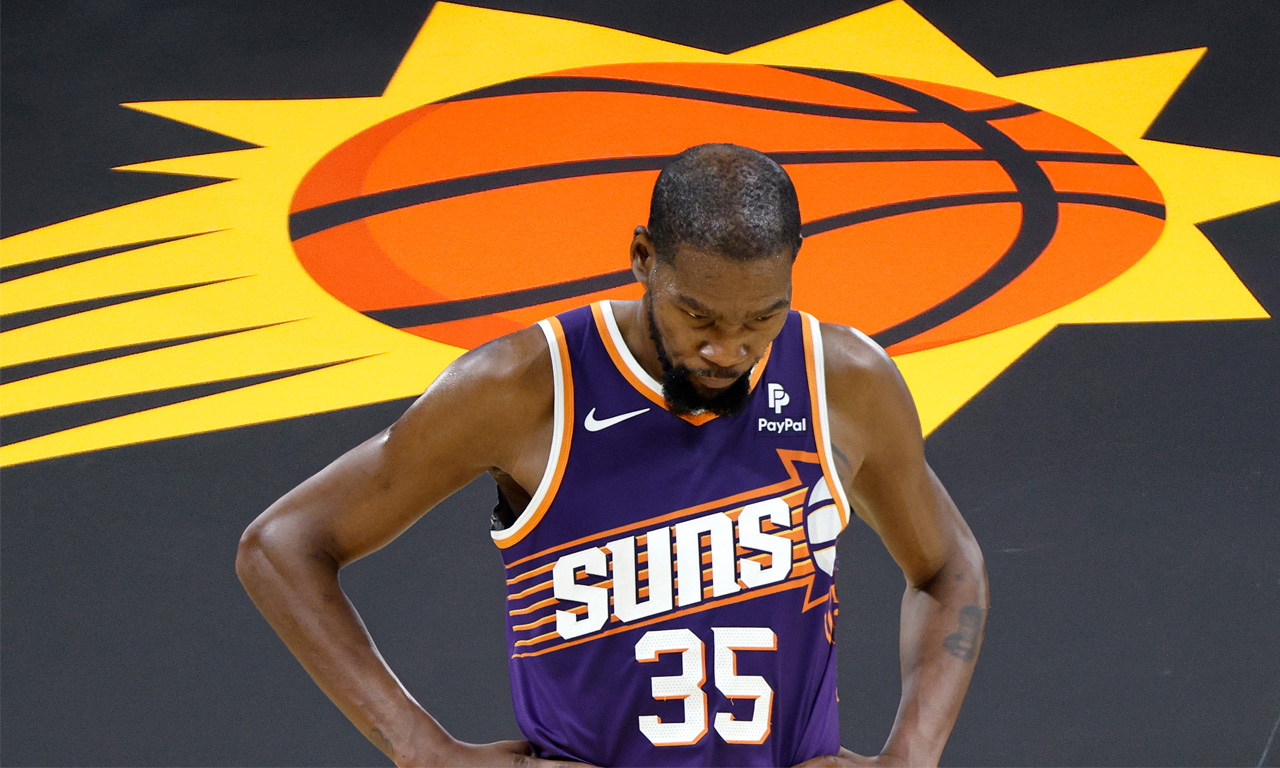
As the Houston Rockets set to host the Phoenix Suns tonight, it seems the right time to take a look back at the trade that linked these two franchises together for the foreseeable future.
This past June, the Rockets made a trade with Brooklyn that sent back to the Nets control of their 2025 and 2026 unprotected first-round picks. In exchange, the Rockets received a large chunk of Phoenix’s future (2025, 2027, 2029) and control of the Dallas Mavericks’ 2029 first.
In essence, the Rockets traded one pick and one swap for two picks and two swaps. All unprotected.
Thoughts At The Time of the Trade
If I’m going to discuss the current outlook of this trade, I have to be honest about how I saw it at the time of the move. While I didn’t hate this trade initially, I definitely didn’t love it either.
I liked that the Rockets increased their overall trade assets. I also liked that they extended the timeline to be able to make a bigger trade and I also appreciated that they kept control of the 2027 Brooklyn swap.
But I didn’t like that the Rockets gave up what seemed like the more established value (Brooklyn) for a more uncertain gamble (Phoenix). The Rockets did not control a “tanking runway” of picks to offer back to Phoenix — all of the picks Houston got in the deal were in staggered years (’25, ’27, ’29). I also felt Brooklyn, who badly needed to rebuild, got away with paying market value to get their picks back despite the fact that the Rockets invested years in watching those picks appreciate up to the point that they had the Nets completely over a barrel.
Net-net: I felt like more certainty was traded for less certainty and it was more of an equitable trade for both teams rather than Brooklyn paying dearly to get back the things only the Rockets could offer.
There were two ways I thought this trade could pay dividends: The Suns needed to flame out immediately, as in this season (unlikely), or the Rockets could trade all those pick assets as part of a deal for a real superstar in the next 12-18 months (more likely).
In a testament to how quickly change can occur in a very unpredictable NBA, four things have happened that have been positive indicators for the Rockets in making this move.
The Suns are fading
While Phoenix had major salary cap issues, dealing with the second apron, they didn’t appear to have problems on the court. They jumped out of the gate 8-1 and looked like a legitimate contender behind their star trio of scorers in Kevin Durant, Devin Booker and Bradley Beal.
Given Houston controlled Phoenix’s pick this year via a swap, it looked like the Rockets would come up empty-handed on the trade this season.
That changed quickly.
Injuries, serious depth concerns and a lack of a defensive identity has sent Phoenix spiraling. Booker’s availability has been inconsistent, forcing Durant to carry the load, while Beal has not quite fit in at all. Their financial limitations, thanks to owner Mat Ishbia’s all-in spending spree, have handcuffed their ability to improve the roster around the three stars.
The Suns are sitting 11th in the West, having gone 22-34 since that hot start, and are currently trying to catch a depleted Dallas squad to get back into the play-in picture.
As of right now, the Rockets project to end up with a lottery pick (albeit a late one) this season out of the trade.
Phoenix was caught shopping Durant
Because the Suns struggled so hard after the start, they tried to make a major move at the deadline but could not unload Beal, in large part due to his no-trade clause.
As a result, they may have made a misstep: They openly tried to trade Durant, which inevitably became public news.
Now? Durant will almost assuredly be traded this summer — likely to a destination that he handpicks. This means the Phoenix Suns will have to look at all possibilities for their future, including potentially having to give Rafael Stone and the Rockets front office a call.
But keep in mind, the Rockets can not offer Phoenix the ability to completely rebuild via the draft right now. Phoenix’s 2026 pick is controlled by Washington. They would have to get extremely creative to set that stage. A retool in Phoenix is much more likely.
Could Brooklyn have been better than expected?
This one is tougher to gauge.
The Brooklyn Nets are currently tied for fifth-worst team in the league, giving them strong lottery odds this summer. This was expected. After all, the Nets, even with a healthy Mikal Bridges and a full roster, were not a good team last season, closing the year 20-41 in the final three quarters of the season. The Rockets ended up with the #3 pick (Reed Sheppard) as a result of Brooklyn’s mediocrity.
However, if the Rockets had not placed that pick back in Brooklyn’s hands, would the Nets be better than this?
Brooklyn brought in a new coach in Jordi Fernandez that has had a positive impact. They have dumped off players, such as Dennis Schroeder and Dorian Finney-Smith, that impacted winning. The bar to make the play-in in the East (.415 winning percentage) is obscenely low, with Brooklyn being just five wins away from it at the moment.
And on top of that, Brooklyn did have lots of draft capital that they could have moved to try to win now.
It’s very tough to say as you don’t know if a team with Bridges still in Brooklyn might have actually been worse than this current squad, but you could make a case that the pick the Rockets would have ended up with from Brooklyn this season would be eerily similar to the one they will end up getting from Phoenix this year.
Again, this is a tough call.
Nico Harrison Hooked the Rockets Up
As part of the trade, the Rockets got control of the Dallas Mavericks’ 2029 first-round pick (unprotected, of course). While there’s really no way of knowing what a pick will be five years out, we did know that Luka Doncic would be just 29-30 years old that season and it was fairly etched in stone that he would be the core piece of a Dallas squad that season.
Enter chaos in Dallas.
Doncic was shipped out in the trade that shocked the world, which could have a major impact on the Rockets. Dallas’ current core of Kyrie Irving and Anthony Davis will be 37 and 36 years old that season, respectively.
On paper, the value of that pick shot up.
Final Summary
Right now, the outlook on these picks looks strong. One source stated off the record that they feel the 2029 Phoenix pick is the best pick asset out there that is owned by another team. The Rockets would be reluctant to add that one specifically into any trade unless it’s for a truly legitimate star.
But if there is any lesson that the NBA teaches us over and over again, it’s that it’s very hard to predict where a team will be a year from now, much less three years from now.
Can the Rockets pressure Phoenix and leverage the ownership they have of their draft capital to get what they really want (Booker) from them? Could a Suns retool around Booker and Beal, with the right pieces and assets acquired from a Durant trade, significantly change their on-court outlook and cap sheet — which in turn could damage the value of the picks Houston controls?
Bottom line is it has worked out well this season, and the future forecast at the moment is promising. The current value of those future picks appears strong. What will likely determine history’s final grade for this trade will be how it sets them up for the trade to come, and that’s where fans will be looking to Stone and the front office for action starting this summer.
Houston Rockets
Amen Thompson’s ankle injury will be re-evaluated in one week
“The things he does you can’t replicate,” says Rockets coach Ime Udoka
Published
4 weeks agoon
March 10, 2025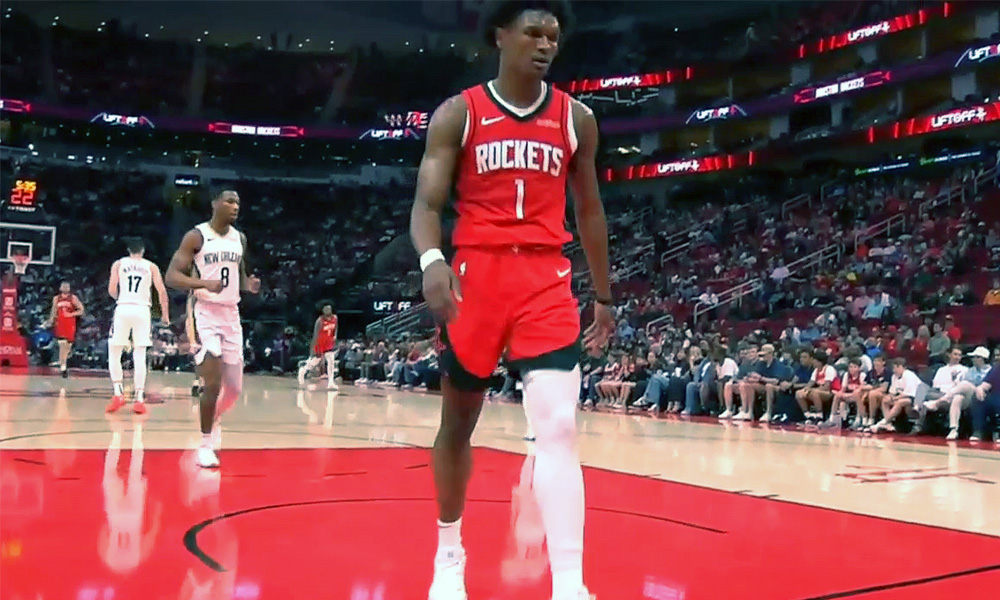
Rockets young star Amen Thompson will have his ankle injury re-evaluated in one week, according to Ime Udoka.
Thompson had an MRI on Sunday and the Rockets coach confirmed all imaging (X-ray, MRI) was negative.
“Just some swelling and pain, obviously,” said Udoka.
If you listen to Udoka, you can tell he knows how special Amen is to this team. He said the Rockets are missing a lot by not having him out there.
“Obviously, the things he does you can’t replicate,” said Udoka. “[Amen is] a guy that plays every position for us. When one goes down, he runs the point. If another is out, he runs the four.”
Amen is one of the best defensive players in the game, and as a one-on-one defender of guards/wings, he might already be the best in the league in just his second season. He’s holding his opponents to 40.5% shooting from the field, tops in the league.
“He’s a very unique defensive player,” said Udoka. “We got some guys that do some great things there, but I like to put him and Dillon on the best two usually, night to night. You got Tari and that’s a luxury as well, but the way he goes about it is different. His athleticism, size, speed, strength, shotblocking ability, steals… he’s all over the place.”
“Hard to replicate for sure.”
Amen injured his ankle late Saturday night in a blowout win against the Pelicans, but the unfortunate part was he probably should not have been on the floor in the first place.
The Rockets left Amen Thompson in the game in a blowout to get one more rebound for a triple-double and he just got injured. He's heading to the locker room with a limp. https://t.co/UBtrEpgWuU pic.twitter.com/D8GeKP8sQk
— ClutchFans (@clutchfans) March 9, 2025
The Rockets had built well over a 30-point lead by early fourth quarter. Jalen Green was able to rest the entire fourth. Alperen Sengun came out of the game with 7-8 minutes left while Dillon Brooks and Tari Eason came out with 6:00 left. But Thompson, who had posted an insane +39 on-off number, remained in the game because he was one rebound shy of a triple-double with 15 points, 11 assists and nine rebounds.
Udoka addressed that decision on Monday before the game against Orlando.
“What I typically don’t do is wholesale substitutions,” said Udoka of the decision to keep Amen in the game. “Albeit 30[-point lead] at six minutes [left] is different than losing to Minnesota, a 16-point lead with four minutes [left].”
“I’ve seen it go both ways in the past. You take out guys too early and have to bring starters back, and vice versa.”
Thompson has played in 60 games this season, five short of being eligible for postseason awards. He absolutely should be up for an All-Defensive nod this season so keep an eye on him getting back in time for that. He would need to return to action no later than April 4th for the game against the OKC Thunder in order to play enough games to be eligible.
Houston Rockets
How the Kyrie Irving Injury Impacts Rockets
Houston’s draft positioning and offseason plans could be impacted by Dallas
Published
1 month agoon
March 4, 2025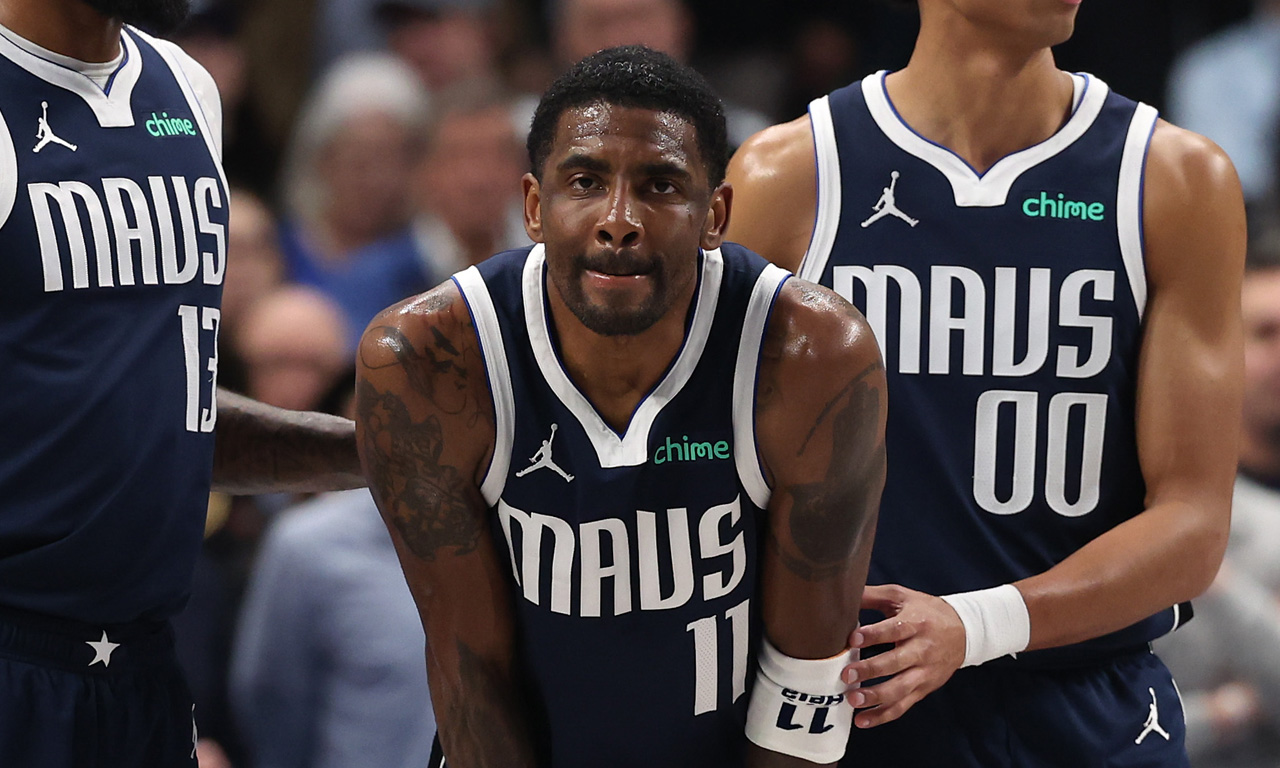
Dallas Mavericks guard Kyrie Irving was injured Monday night and the news dropped on Tuesday that the knee injury is serious — a torn ACL in his left knee that will end his season and a good portion of next season as well.
Brutal. I can’t think of an NBA team that imploded faster than the Dallas Mavericks.
You trade away a 25-year-old phenom who just hoisted you on his back en route to the NBA Finals a year ago. You cashed in that golden ticket to go all-in on a trio of aging stars in Kyrie, Anthony Davis, and Klay Thompson.
Bold strategy, Nico. Let’s see if it pays off.
(Narrator: It’s not paying off.)
The Mavericks had some interesting potential this year and maybe the next couple of years once everyone was healthy, but now? Their star guard is likely out until the calendar year 2026 and Klay and AD aren’t getting any younger nor more durable. The Mavericks may have actually swapped their future for a present that never arrives — and Dallas GM Nico Harrison has to be feeling overwhelming pressure right now.
So how does this impact the Rockets?
For starters, Houston has a game remaining on the schedule against Dallas on March 14th at Toyota Center — Davis may or may not be back for that game.
More importantly, Dallas is the 10th seed in the West at the moment, just 3.5 games ahead of the Phoenix Suns (11th seed). The Rockets control Phoenix’s first-round pick unprotected this season via a swap. We need as many West teams as possible ahead of Phoenix to keep them out of the play-in/playoffs and to push them as deep into the lotto as possible.
This complicates that. Phoenix’s remaining schedule is the toughest in the NBA by a good margin, with plenty of games left against the league’s best teams, so it still looks promising overall — but we’re talking about Kevin Durant, Devin Booker and Bradley Beal. They can still get hot at the right time while Dallas may struggle.
So keep a close eye on that. The good news is the Portland Trail Blazers are one of the hottest teams in the league and they are (shockingly) nipping at the Arizona squad’s heels.
Taking a look ahead to the offseason, the Kevin Durant Pursuit will be big.
This one is a little more complicated for Houston. The Rockets really want Devin Booker but, as of now, the Phoenix plan appears to be to trade KD this offseason and retool around Booker. The Rockets will have interest in Durant but they’re not going to sell the farm (prospects and all the picks) for a 37-year old like they would for Booker.
Three teams that I’ve heard a lot about from Rockets circles that will be in the mix are Houston, Minnesota and Dallas — Timberwolves and Mavericks have been considered the main competition. But, a lot of this will depend on Durant himself and where he wants to play at this stage of his career.
Keep in mind also, if the Suns are “retooling” around Booker and Beal (holding the no-trade clause), then they could be placing a higher priority on win-now players over the return of their own draft assets. The Rockets definitely have the best assets overall to offer up in any trade package between those three teams, but if Phoenix does prefer finding the right ready-to-win players around Booker/Beal, that gives Dallas and Minnesota a real chance.
This injury “may” take Dallas out of the equation, and they are/were definitely a contender for KD’s services given his past relationship with Kyrie and the way Dallas was positioned to win right now. Does KD at his age want to wait for Kyrie to be healthy?
And one last friendly reminder: The Rockets control that Dallas 2029 first (unprotected).
Houston Rockets
Rockets Sign David Roddy to Two-Way Contract
Former first-round pick has played with the Grizzlies, Suns and Hawks
Published
1 month agoon
March 3, 2025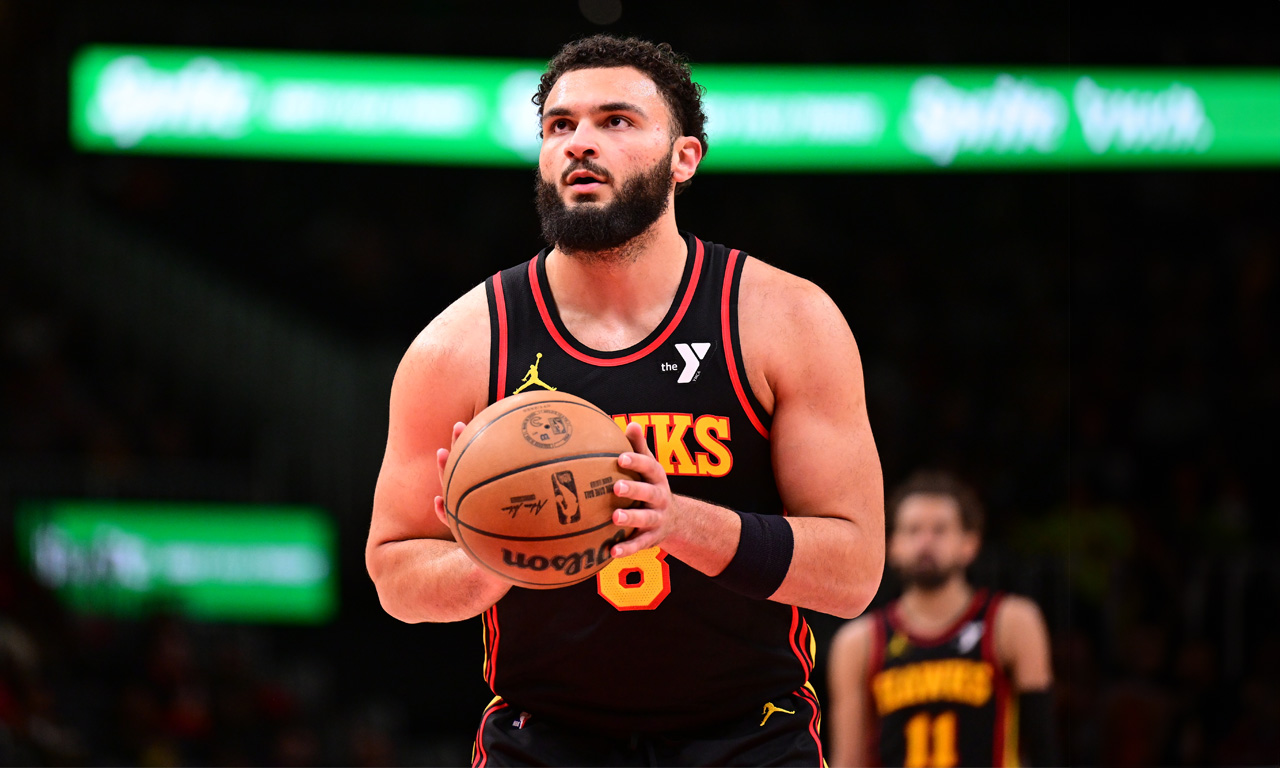
The Rockets made a move on Monday, signing former first-round pick David Roddy to a two-way contract.
The two-way spot opened up after the front office signed Jeenathan Williams to a standard four-year, $8.2 million contract (with friendly team options all along the way).
Roddy is 6-foot-5 and 250+ pounds but sports a 6-foot-11 wingspan. He was taken with the 23rd pick in the first round of the 2022 NBA Draft — six selections after the Rockets drafted Tari Eason. A standout in college, Roddy averaged 19.2 points, 7.5 rebounds, 2.9 assists, 1.2 steals, and 1.1 blocks per game during his junior season at Colorado State.
Roddy, who turns 24 later this month, is a physical player who can play multiple positions. He’s a solid rebounder for his size/position. He has played in 165 games over three seasons with the Grizzlies, Suns, Hawks and most recently Sixers, averaging 6.2 points and 2.9 rebounds per game.
The guard/forward has not shown efficient shooting, however — he’s a career 30.5% three-point shooter and just 68.4% from the line. His defense is better inside than out.
Ultimately, it will be those two things — three-point shooting and defense — that will determine his chances of carving out a consistent role in the league.
All in all, it’s a low-risk signing and the Rockets get a look at a prospect that fits their age timeline.
Houston Rockets
Houston a potential landing spot for Ben Simmons post-buyout?
Published
2 months agoon
February 6, 2025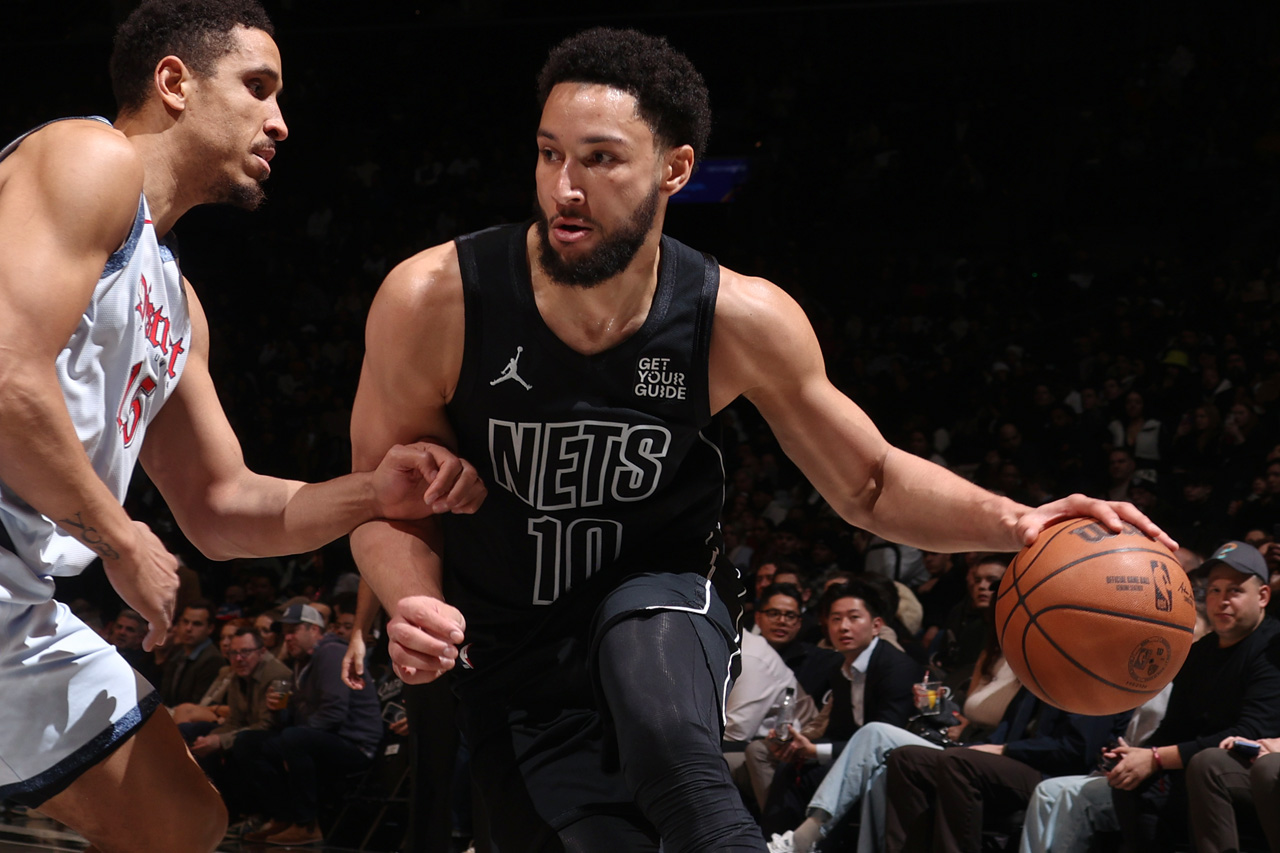
ESPN NBA analyst Brian Windhorst said on Thursday’s NBA Trade Deadline show that Brooklyn Nets forward Ben Simmons is working on a buyout and the Houston Rockets is a potential landing spot for him.
“Cleveland and Houston are two situations for Ben Simmons,” said Windhorst.
Brian Windhorst says the Cavaliers and Rockets are buyout locations for Ben Simmons.
Thoughts? pic.twitter.com/7ly4mvmxr5
— ClutchFans (@clutchfans) February 6, 2025
Advertisement
Rockets coach Ime Udoka was an assistant coach in Philadelphia in 2019-20 when Simmons was with the Sixers, before injuries took a significant toll. In fact, Udoka, when speaking about Amen Thompson earlier this season, brought up some comparisons to Simmons.
“The skill set is there, and it’s something that’s unique with his speed, athleticism, size, passing ability, and all those things,” said Udoka of Thompson. “I coached somebody, Ben Simmons, who had similar traits… as far as size and ability to push the pace, and find guys and finish. There are some similarities there.”
Both Thompson and Simmons are known for their elite athleticism, defensive versatility, and ability to create opportunities in transition.
However, can Simmons help the Rockets today? That’s the tough question.
Simmons has played in 33 games this season, averaging 6.2 points, 6.9 assists, 5.2 rebounds, 0.8 steals and 0.5 blocks in 25 minutes a night. He does not shoot threes (like, at all) — he has only attempted two threes in the past three seasons combined.
Ideally, he does not play in front of your young forwards of Amen, Tari Eason and Jabari Smith Jr. and on that basis alone, I think I would pass. But, Ime loves defensive dogs and he could use some extra ballhandling on the roster. You can see that there’s little in the way of offensive organization when Fred VanVleet is out.
There would be a comical full circle moment though if the Rockets did sign Ben Simmons, considering the Rockets were heavily criticized for trading James Harden in 2021 to Brooklyn instead of to Philadelphia for Simmons. The Rockets clearly made the right choice there.

